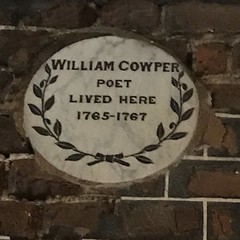William Cowper
Commemorated on 5 plaques
Site of "The Bell" demolished 1963 immortalised in Cowper’s poem "John Gilpin" 1785
On building (ex Job Centre), Fore Street, N18 (between College Gardens and Cowper Road), Enfield, London, United Kingdom where they wrote about
William Cowper poet lived here 1765-1767
29 High Street, Huntingdon, United Kingdom where they lived (1764-1766)
Berkhamsted Heritage Walk #25
William Cowper’s School c. 1700
212-220 High St, Berkhamsted, United Kingdom where they attended school
Olney Parish Church. Completed in 1325AD, this church is associated with William Cowper, the poet, and John Newton, Curate-in-charge and one-time slave trader; these two wrote "The Olney Hymns". Other outstanding characters include Henry Gaitlett, "Father of English Church Music", Moses Browne, of many parts (and many children) and Thomas Scott, the Bible commentator. The church of the Olney Pancake Race.
Olney Parish Church, Olney, United Kingdom where they worshipped
William Cowper 1731 - 1800 Poet & letter-writer Translator of Homer Lived here 1768 - 1786
Cowper & Newton Museum, Orchard Side, Olney, United Kingdom where they lived (1767-1785)





